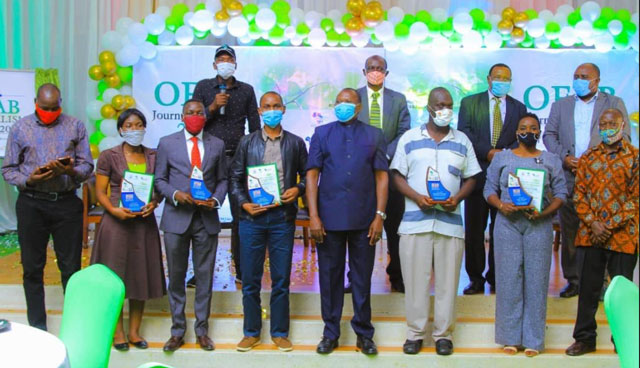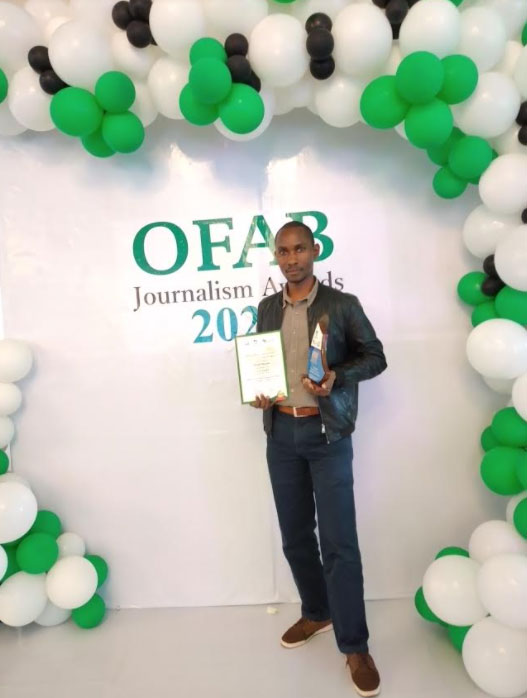
The Independent shines at OFAB Journalism Awards
Kampala, Uganda | THE INDEPENDENT | The Independent’s Ronald Musoke is among six journalists that have been recognized at this year’s Open Forum for Agricultural Biotechnology in Africa (OFAB) Journalism Awards.
This year’s awards in Kampala, the 4th by OFAB, recognized winners of 2018, 2019 and 2020. OFAB Africa works to improve understanding of biotechnology and Biosafety innovations in Uganda, Kenya, Ethiopia, Tanzania, Burkina Faso, Nigeria and Ghana.
Musoke won the 2019 Print/Online Category for his story; “Museveni’s GMO law dilemma.” (CLICK to read)
The same story got him First Runner position at this year’s Uganda National Journalism Awards organized by the African Centre for Media Excellence (ACME). He was also runner-up at last year’s continental OFAB Media Awards ceremony organized in Mombasa City in Kenya.
Each of the winning journalists recognized by OFAB at the ceremony held on Nov.20 at Golf Course Hotel in Kampala went home with a cash prize of Shs 3 million, a plaque and a certificate.
Other past winners recognized for their work included; Christopher Bendana of The New Vision (Print/Online winner (2018), Gabriel Iguma, formerly of Wizarts Media (Radio Category winner 2019) and Jackie Deweyi, formerly of Top Television (Television Category winner, 2019).

The 2020 winners
Ismail Musa Ladu of Daily Monitor won the 2020 Print/Online Category for his story; “Is Science the prescription for effects of Climate Change on agriculture, trade?” Ladu’s story looked at how business/economy can benefit from agriculture, science and biotechnology innovations.
“I was pleasantly surprised that I won this award because I am not an out and out science journalist; I am a business reporter,” Ladu told The Independent, “The story explored the interconnect between science, innovation and technology and its spin-offs for business.”
Sarah Natoolo of UBC Radio won in the radio category for her feature on how the delay in passing the Genetic Engineering Regulatory Bill, 2018, is affecting agricultural research and development in Uganda.
Meanwhile, Ronald Kulabako Kato of the pan-African broadcaster Africa News won the television category for his feature on how the Karimojong pastoralists are caught between Climate Change and government policy.
Kato’s story explored how science, particularly biotechnology, can help alleviate the suffering of Karamoja’s pastoral communities. “It is an honour to win this award,” Kato told The Independent.
Kato who is now based at the Africa News headquarters in Lyon, France, told The Independent that OFAB is doing well to support science journalism at a time when newsroom budgets dedicated to reporting original stories are being cut.
The chief guest, Dr. Elioda Tumwesigye, the Minister of Science, Technology and Innovations, in a speech read for him by Dr. Maxwell Otim Onapa, the deputy executive director of the Uganda National Council of Science and Technology, noted that OFAB’s initiative of rewarding journalists is timely.
“We hope we shall have responsible professional ethical and effective reporting on biotechnology to enhance adoption of this useful technology in Uganda and the required regulatory regimes,” he said.
Speaking about the delay in passing the Genetic Engineering and Regulatory Act 2019, Tumwesigye blamed what he referred to as “needless controversies” that originated from international bio-safety instruments such as the Cartagena protocol and the convention on biodiversity.
Despite the impasse that surrounds the passing Uganda’s law on regulating biotechnology, Phillip Chemonges, the OFAB Uganda Chapter Coordinator said the team at the Uganda National Science Council of Science and Technology will not relent in its efforts to sensitize Ugandans about the positive role that biotechnology can play not only in agriculture but in other areas such as industry.
Chemonges said in its quest to further deepen the understanding of biotechnology; we have today launched the OFAB Grants, which will be given to past winners of OFAB Journalism Awards, to help them to do more stories that can further improve the understanding of biotechnology innovations among policy makers and members of the public.
 The Independent Uganda: You get the Truth we Pay the Price
The Independent Uganda: You get the Truth we Pay the Price






Thanks, good work.